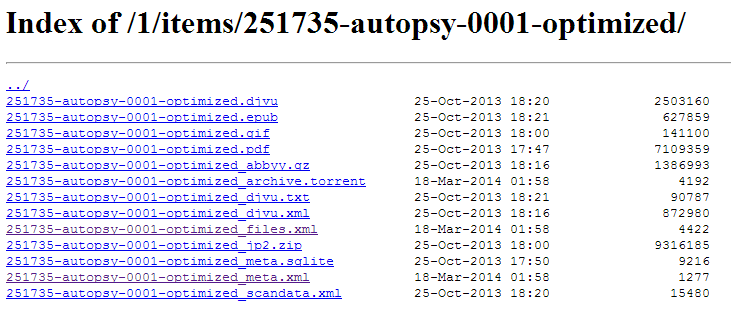User:Δεριζαματζορπρομπλεμιναυστραλια/PrototypingnetworkedmediaSniff Scrape Crawl: Difference between revisions
No edit summary |
No edit summary |
||
| Line 81: | Line 81: | ||
failed to install gevent error with vcvarsall.bat | failed to install gevent error with vcvarsall.bat | ||
ia mine can be used to | ia mine can be used to retrieve metadata for items via the IA Metadata API. | ||
'''Get all links from a collection | |||
''' | |||
I also found this nice code! | |||
(with beautiful soup) | |||
<source lang="python"> | |||
import urllib2 | |||
from bs4 import BeautifulSoup | |||
# Get the HTML for each list of results from the BPL collection. URLs look | |||
# like this: http://archive.org/search.php?query=collection%3Abplscas&page=1 | |||
for resultsPage in range(1, 9768): | |||
url = "https://archive.org/search.php?query=collection%3Aopensource&page=" + str(resultsPage) | |||
response = urllib2.urlopen(url).read() | |||
soup = BeautifulSoup(response) | |||
links = soup.find_all(class_="titleLink") | |||
for link in links: | |||
itemURL = link['href'] | |||
f = open('collections2nikos.txt','a') | |||
f.write('http://archive.org' + itemURL + '\n') | |||
f.close() | |||
</source> | |||
and with this we can get an html page with the links of each list of results. | |||
SOURCES | |||
http://blog.archive.org/2011/03/31/how-archive-org-items-are-structured/ | |||
http://programminghistorian.org/lessons/data-mining-the-internet-archive | |||
http://programminghistorian.org/lessons/working-with-web-pages | |||
Revision as of 21:22, 29 June 2014
archive.org
Items include multiple files dublin core or fuller marxml records that use the L.o.C. marc21 format for bibliographic data
Information about every file in this directory by viewing the file ending in _files.xml , all of the metadata for the item, view the file ending in _meta.xml :
Identifier
The globally unique ID of a given item on archive.org
collections and items all have a unique identifier
(taken by the Title field of the entry)
item: 251735-autopsy-0001-optimized
collection: opensource_Afrikaans
Archive.org and python found this code to open item in command line
# open-webpage.py
import urllib2
url = 'https://archive.org/details/dasleidenunsersh00bras'
response = urllib2.urlopen(url)
webContent = response.read()
print webContent[0:500]
and then this for html output .
# save-webpage.py
import urllib2
url = 'https://archive.org/details/bplill'
response = urllib2.urlopen(url)
webContent = response.read()
f = open('bplill.html', 'w')
f.write(webContent)
f.close
internetarchive 0.6.6 =A python interface to archive.org
1) ia for using the archive from the command line
2)internet archive for programmatic access to the archive
Accessing an IA Collection in Python to see number of items:
import internetarchive
search = internetarchive.Search('collection:nasa')
print search.num_found
Accessing an item
ia download 251735-autopsy-0001-optimized (or types, mp4etc)
ia metadata 251735-autopsy-0001-optimized (metadata in command line)
import internetarchive
item = internetarchive.Item('251735-autopsy-0001-optimized')
item.download()
Data mining
failed to install gevent error with vcvarsall.bat
ia mine can be used to retrieve metadata for items via the IA Metadata API.
Get all links from a collection
I also found this nice code!
(with beautiful soup)
import urllib2
from bs4 import BeautifulSoup
# Get the HTML for each list of results from the BPL collection. URLs look
# like this: http://archive.org/search.php?query=collection%3Abplscas&page=1
for resultsPage in range(1, 9768):
url = "https://archive.org/search.php?query=collection%3Aopensource&page=" + str(resultsPage)
response = urllib2.urlopen(url).read()
soup = BeautifulSoup(response)
links = soup.find_all(class_="titleLink")
for link in links:
itemURL = link['href']
f = open('collections2nikos.txt','a')
f.write('http://archive.org' + itemURL + '\n')
f.close()
and with this we can get an html page with the links of each list of results.
SOURCES
http://blog.archive.org/2011/03/31/how-archive-org-items-are-structured/
http://programminghistorian.org/lessons/data-mining-the-internet-archive
http://programminghistorian.org/lessons/working-with-web-pages

